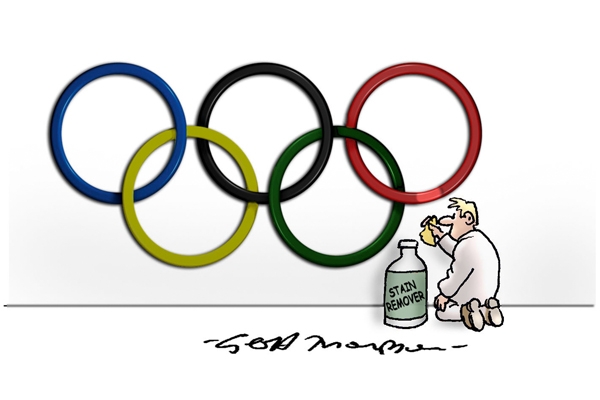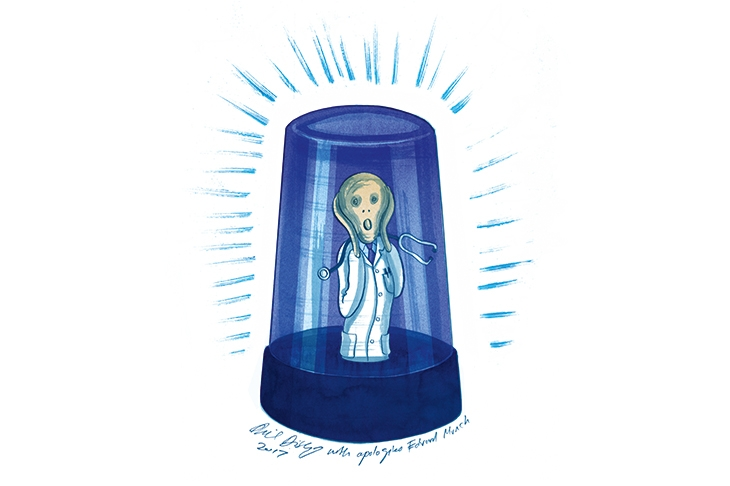For the first time since its first race in 1903, the Tour de France didn’t finish in Paris this year. The world’s best cyclists, Tadej Pogacar and Jonas Vingegaard, were banished to the south coast after a gruelling three-week race, received by a small crowd as they struggled into the Place Masséna in Nice. Their achievements were purposefully overshadowed by Emmanuel Macron’s political folly: the largest opening ceremony in the history of the Olympic Games.
Macron has commandeered the Games as part of his unending mission to save France. He seeks political unity to ‘showcase the entire France’ at the Games but his left-wing opponents accuse him of hiding behind a concocted ‘Olympic truce’. Macron has insisted on the ceremony being larger than any before it. The political messages are usually inescapable: Beijing advertised its autocratic efficiency, London was a twee tribute to British liberalism, and Rio a carnival to distract from the government’s corruption scandal. But once the ceremonies were done, the Games could begin.
This is not the case for Paris. Macron has ordered that an armada of 160 barges will carry 10,000 athletes down the Seine followed by a festival at Trocadéro. To do this the government sealed off much of the centre of Paris, installing 44,000 security barriers which locals need QR codes to enter. Officials claim 300,000 fans will line the banks of the Seine. In reality many locals have fled. Waiters stand outside empty bistrots to lure customers, and taxi drivers moan that their takings halved overnight. Even worse for the Games themselves, more than a million tickets remain unsold.
British Olympians are reduced to flogging Quorn and Weetabix on the telly
As a result, the Paris Olympics has grown into a political spectacle that detracts from the achievement of the athletes. Pierre de Coubertin, the father of the modern Olympics and a Parisian, wanted the Games to celebrate the participation of sport as much as the winning. The ethos was best expressed in the last Paris Olympics a century ago where Scottish missionary Eric Liddell took gold in the 400m – a feat immortalised by Chariots of Fire. There was already a creeping professionalism among athletes in games, but that mattered little – after all the ancient Greek Olympians were trained professionals – as Coubertin’s aim to ‘exalt the individual athlete’ remained. The greater the political noise around the Games, the more it risks turning into an exhibition rather than a competition.
More recently the Olympics have been captured by endless sponsorships and corporate deals. In the four years to the 2021 Tokyo Olympics, the International Olympic committee made $7.6 billion. Many Japanese were apprehensive of hosting the games during the pandemic, but in spite of the public’s disillusionment the Games went ahead. They were too big to fail. The head of Japan’s organising committee tried to save face: ‘The essence of the Games will remain the same.’ But it was a lie. Athletes competed under restrictions in front of empty stadiums making events boring and bureaucratic, the resulting TV viewership was 27 per cent less than Rio 2016. Even viewers locked in their homes considered it a soulless spectacle and watched something else.
The IOC’s obsession with money has led to the neglect of athletes. David Wallechinsky, a historian of the Olympics, says that for the IOC, ‘television is the priority’, not athletes. Broadcast makes up two-thirds of the committee’s revenue and the IOC says it reinvests 90 per cent into sport, but little of the money makes its way to the athletes. It’s bad enough that athletes are housed in grotty Olympic villages and made to sleep on cardboard beds. Recently retired American sprinter Allyson Felix said that she used to think the ‘Games were so much about the competition’. By the Tokyo Games, however, ‘I got where we fall in the grand scheme of this ginormous thing that makes a ton of money – the athletes don’t see that money.’ That’s why we see British Olympians reduced to flogging Quorn and Weetabix on the telly.
If the IOC is not there for the athletes, then who is it for? Even the integrity of the sport also seems of secondary importance. It declined to investigate the 23 Chinese swimmers who tested positive for a banned drug seven months before the Tokyo Games. The World Anti-Doping Agency had accepted Chinese officials’ explanation at face value that the drug came from a contaminated kitchen at the athletes hotel. Three of these swimmers went on to win golds. The doubt over the doping is unfair on all the competing athletes, the winners included, and sets a dangerous precedent. If the IOC’s judgment can lapse on such a large accusation, more countries will dope their athletes. The IOC doesn’t mind. Its main interest is keeping countries and sponsors happy and its coffers full.
Other Olympics had their faults: Montreal in 1976 ran 720 per cent over budget, almost bankrupting the city, and the Americans and Soviets boycotted each other’s Games in 1980 and 1984. But they were still memorable Games with memorable events and memorable athletes.
It shouldn’t be hard for the Parisian Games to be spectacular. Its venues include beach volleyball in front of the Eiffel Tower, as well as archery, cycling and athletic events at Les Invalides. But Macron’s antics and the IOC’s greediness are harming de Coubertin’s Olympic ideals, and the integrity of sport itself.








Comments